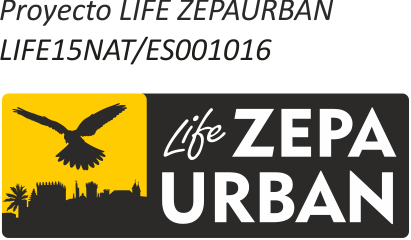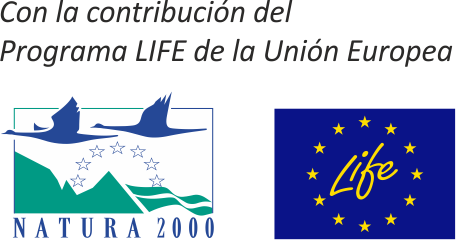Replicability strategy for the LIFE ZEPAURBAN project
During the first year of the project a Replicability Strategy will be designed whose principal objective will be the transfer of technical knowledge, results obtained in the project, problems encountered and lessons learned during and after the end of the project.
It is the aim that this Strategy will be a multiplier of the impact of the project, offering solutions found to a wide spectrum of agents involved in lesser kestrel conservation, which can be applied to other places where the species occurs, both at a national as well as at a European level.
The development of Networking activities with similar projects or working groups on lesser kestrels, will be one of the fundamental elements to push the transfer of results and solutions and promote its replication in other areas.
The Strategy will depend on a set of clearly defined activities, with a calendar of tasks, each with an identified leader. Materials produced by different actions of the project will be used, particularly the videos and manual of good practice in architectural restoration work (actions E3 and E5), the manual of good farming practice and the catalogue of tourist experiences (E5).
The development of this Strategy will be undertaken through different actions of the project (E2 – international workshops, E4- Website, E10 – Dissemination of the tourist product) but also through specific diverse activities, which will include:
- Transfer of the results of the new models of nest boxes developed in the project.
- The work undertaken and results obtained in the project will be analysed with what has been obtained with other types of boxes elsewhere. Activities to share information will be planned with lesser kestrel working groups in other autonomous communities in Spain and in other EU countries (Portugal, Italy, Greece and Bulgaria).
- Transfer of census protocols and methodologies for urban colonies of lesser kestrels.
- To obtain a widely agreed census protocol, discussions will be planned with other lesser kestrel working groups in other autonomous communities in Spain and in other EU countries (Portugal, Italy, Greece and Bulgaria).
- Transfer of training for building companies.
- The Good Practice Manual for Restoration of Buildings will be shared with other businesses in Extremadura, as well as with other lesser kestrel working groups in other autonomous communities in Spain and in other EU countries (Portugal, Italy, Greece and Bulgaria).
- Transfer of good farming practices favourable for lesser kestrels.
The work undertaken and results obtained in the project will be analysed with those obtained from other places and projects, considering the specificities of each area. The Manual of Good Farming Practice favourable to lesser kestrels (prepared in action E5) will be shared in Extremadura through farming associations, with the support of the Council for the Environment, Rural Affairs, Farming Policy and Territory of the Government of Extremadura, as well as with other autonomous communities and other countries (Portugal, Italy, Greece and Bulgaria).
- Transfer of the management model for urban SPAs to other autonomous communities in Spain and in other EU countries (Portugal, Italy, Greece and Bulgaria).
- Transfer of the results of the tourist product of the lesser kestrel, as a model for a contribution to the economic development of rural areas.
- Presentations in international congresses. The work undertaken and results obtained will be presented in international forums related to biodiversity conservation (talk or poster).
- Publications in national and international technical specialist journals, and in generalist magazines.
The Replicability Strategy will be approved by the Monitoring Committee of the project.
Networking
Emphasis will be made to networking with working groups and conservation projects on lesser kestrels, currently being implemented or already completed, to analyse the solutions applied and the results obtained through the life of the project with practice in other geographical areas and in other countries, taking into account the different characteristics and specificities of each zone, the different timing of the species based on place and the possibility of different responses by the species to the measures in place.
Therefore, networking with other projects will be a fundamental tool for the development of the Replicability Strategy of the ZEPAURBAN LIFE project.
Some of the LIFE projects that will be considered in the development of this action will be the following:
- Lesser Kestrel Thessaly- Conservation and Management of the Lesser Kestrel (Falco naumanni) at three Greek SPA sites (LIFE11 NAT/GR/001011)
- Lesser Kestrel Recovery- Greater chance for Lesser Kestrel (Falco naumanni) in Bulgaria (LIFE11 NAT/BG/000360)
- Un Falco per Amico- Integrated effort for the conservation of the Lesser Kestrel in the SPA "Murgia Alta" (LIFE11 NAT/IT/000068)
- Estepárias- Conservation of Great Bustard, Little Bustard and Lesser Kestrel in the Baixo Alentejo cereal steppes (LIFE07 NAT/P/000654)
- LIFE TRANSFERT- Reinforcement and conservation of Lesser Kestrel populations in Aude (FR) and Extrémadure (ES) (LIFE05 NAT/F/000134)
- Peneireiro- Re-establishment of the Lesser Kestrel (Falco naumanni) in Portugal (LIFE02 NAT/P/008481)
- Falco Aragón- Conservation of Falco naumanni nesting habitat in Aragon (LIFE00 NAT/E/007297)
- Falco naumanni/Villafafila- Conservation Lesser Kestrel (Falco naumanni) in the S.P.A. Villafáfila (LIFE99 NAT/E/006341)
Special importance will be given to the replicability and transferability of the results of the project in other autonomous communities in Spain with the presence of lesser kestrel, as well as Portugal as the closest neighbour. Visits will be undertaken to some of the countries in the EU with conservation projects for lesser kestrel with the aim to learn from experiences developed elsewhere for nesting and foraging habitat management, and to analyse the sustainability and viability of the management measures initiated. Furthermore, working groups in countries that are candidates to the EU will be looked for where there are important populations of lesser kestrel, to complete the Replicability Strategy.
The implementation of the Replicability Strategy will extend beyond the lifetime of the project, promoting the development of future joint action.
Responsible for implementation: General Directorate of the Environment, Terra Naturalis and laruinagráfica.

